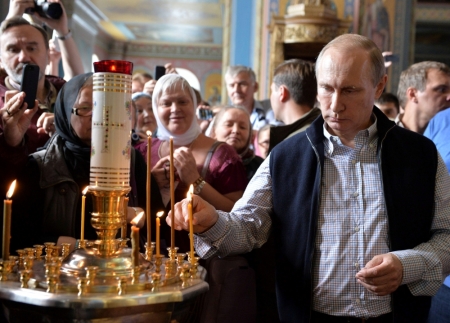Russia's Crackdown on Evangelism Leads to Prosecution of Mostly Christians 1 Year After 'Anti-Missionary' Law

Evangelical Protestants make up the majority of the 181 cases prosecuted by Russian authorities under the country's notorious "anti-missionary" laws, which came into force last July, according to a report. Christians were also prosecuted in Crimea, which Russia occupied in 2014.
Norway-based group Forum 18 recorded 181 cases since July 20, 2016, two weeks after the laws were signed by President Vladimir Putin to ban evangelism outside of churches.
Of these prosecutions under Parts 3, 4, and 5 of Administrative Code Article 5.26, as many as 57 cases were against Protestant churches, including Pentecostals; 26 against Baptists; six against people associated with the Gideon's; and three against Seventh-day Adventists.
There were also cases prosecuted against 41 Jehovah's Witnesses, four Mormon-related cases, three Buddhists, nine Muslims and 12 Hare Krishnas.
Activities such as holding prayer meetings in homes and posting worship times on a religious community's website "have all been interpreted by police and prosecutors as 'missionary activity,'" according to the report.
Part 3 punishes "implementation of activities by a religious organization without indicating its official full name, including the issuing or distribution, within the framework of missionary activity, of literature and printed, audio, and video material without a label bearing this name, or with an incomplete or deliberately false label."
Part 4 punishes "Russians conducting missionary activity," and Part 5 deals with "foreigners conducting missionary activity."
However, it is still not clear what can amount to a "missionary activity."
Russia has also imposed these punishments in Crimea, filing 27 administrative cases, in which 16 of the cases have thus far resulted in fines.
The amendments were introduced as part of an "anti-terrorism" law.
American Pastor Donald Ossewaarde, an independent Baptist missionary who has been living in Oryol, a town 224 miles south of Moscow, for about 15 years, was charged and convicted last August.
"I was accused of gluing two Gospel tracts to a bulletin board at the entrance of an apartment building" and "of conducting a religious service in a private home, which they said was a violation of the new anti-missionary law," the pastor said at the time on his website.
The 55-year-old pastor, who lives in Russia with his wife, was arrested and fined 40,000 rubles, a little more than $600.
"The accusation also claimed that I was at fault for not notifying the government before I began my religious group activities," he wrote. "I pointed out that, while the law allows people to form an organized religious group, it does not require them to do so. People are free to gather together for worship, whether or not they officially organize."
The legislation prohibits the exercise of any missionary activity in residential areas, and also requires believers wanting to share their faith with others, even on the internet, to possess certain documents from a religious association. It provides for a fine of $75 to $765 if the violator is a Russian citizen, and a fine of up to $15,265 in case of an organization, while foreigners can be deported, Adventist Review reported earlier.
The legislation apparently targets religions other than Orthodox Christianity.
It is estimated that 90 percent of ethnic Russians — and around 70 percent of all Russian citizens — identify themselves as Orthodox. Non-Orthodox Christian groups in Russia are seen as rooted in the United States in particular and the West in general.





















